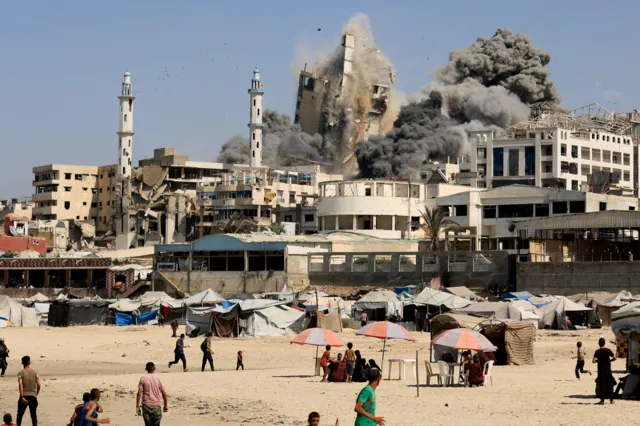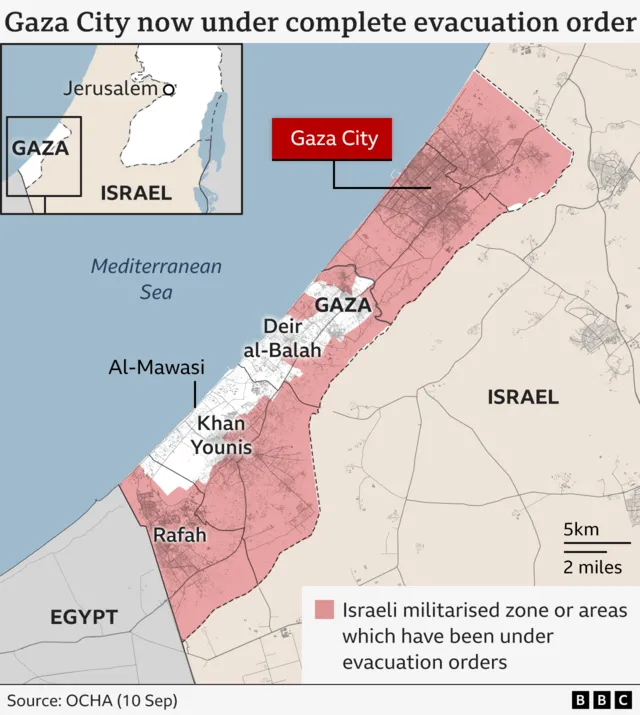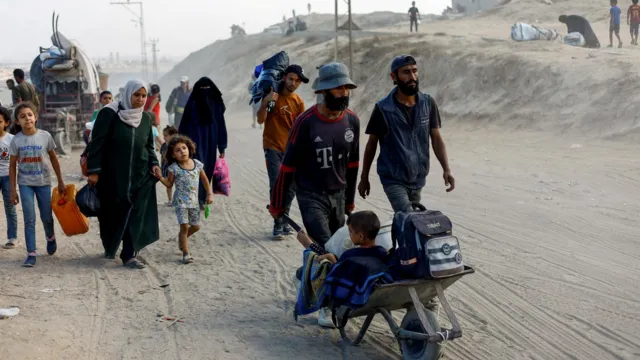Jerusalem — Thousands of Palestinians are fleeing Gaza City as Israeli ground forces intensify their offensive, now in its second day. The United Nations estimates that at least 650,000 people remain trapped in the city, even as Israel pushes deeper into what it describes as Hamas’s “last stronghold.”
Israel says the campaign is focused on freeing hostages and dismantling up to 3,000 Hamas fighters. But the operation has been met with sharp international criticism. More than 20 humanitarian organizations, including Oxfam and Save the Children, issued a joint statement condemning what they called the “unconscionable inhumanity” of the crisis.
The military escalation comes just a day after a UN commission concluded that Israel had committed genocide in Gaza — an allegation Israel’s government has firmly rejected.
Hospitals Under Fire
As Israeli bombardments continued, Gaza’s Hamas-run health ministry reported that al-Rantisi children’s hospital, the enclave’s only specialist facility for pediatric cancer and kidney disease, was struck three times on Tuesday night. While no casualties were reported, solar panels, water tanks, and air conditioning units were destroyed, forcing half of the patients to leave.
“This hospital is a lifeline for children with life-threatening conditions,” said Fikr Shalltoot, Gaza director for Medical Aid for Palestinians. The Israel Defense Forces (IDF) said they were reviewing the reports.
Heavy Strikes and New Tactics
The IDF confirmed on Wednesday that more than 150 targets in Gaza City had been hit in just 48 hours. According to Israeli media, the military is also deploying remotely controlled, explosives-laden vehicles to strike Hamas positions.
“The night was terrifying — non-stop explosions and shelling until dawn,” said Nidal al-Sherbi, a resident, speaking to the BBC’s Arabic service. “Israeli vehicles came from multiple directions. It was unbearable.”
Tower blocks across the city have collapsed under the strikes, sending thick plumes of smoke over the skyline as families rushed to evacuate.

Mass Displacement
For days, large groups of Palestinians have been heading south, carrying belongings on donkey carts, rickshaws, and overloaded vehicles. Initially, families were directed only along the coastal road to a so-called “humanitarian area” in al-Mawasi. On Wednesday, the IDF announced it would temporarily open the Salah al-Din road as a second evacuation route, available for 48 hours.
But many say the journey is unaffordable. Renting a truck now costs the equivalent of $900, while tents for displaced families are selling for about $1,200. Even those who make it to al-Mawasi often find the overcrowded site uninhabitable, forcing some to return north.
“Every day we are told to evacuate while the army bombs around us,” said Munir Azzam, who remains in northern Gaza. “But there is nowhere to go. No real refuge exists.”
The IDF estimates that 350,000 people have left Gaza City in recent weeks, while the UN places the number closer to 190,000 since August.
Mounting Casualties and Famine
According to Gaza’s health ministry, 98 Palestinians were killed and 385 wounded in the past 24 hours alone. Four more died of malnutrition, raising the famine-related death toll in Gaza City to 154 since late August, when a UN-backed body officially declared famine conditions.
Overall, Gaza’s health authorities say at least 65,062 Palestinians have been killed since the war began in October 2023, nearly half of them women and children.
Families of Hostages Protest
Meanwhile, families of the remaining 48 hostages held by Hamas — including 20 believed to be alive — staged protests outside Prime Minister Benjamin Netanyahu’s residence. They argue that the ongoing offensive endangers their loved ones.
“All day long, the government brags about destruction,” said Macabit Mayer, aunt of hostages Gali and Ziv Berman. “But when buildings collapse, who is under them?”
International Reactions
Pope Leo XIV reiterated his call for a ceasefire, describing conditions in Gaza as “unacceptable” during his weekly Vatican address.
The European Commission has also proposed sanctions against Israel over its military conduct and plans to expand settlements in the West Bank. Suggested measures include suspending elements of the EU-Israel trade agreement and sanctioning far-right ministers and violent settlers. The proposals, however, face resistance from some EU member states.
The UN’s recent commission report, which accused Israel of genocide, further intensified global scrutiny. Investigators alleged that Israeli forces deliberately targeted children, used sexual violence, and systematically destroyed cultural and educational sites. Israel dismissed the report as “distorted and false.”

The Broader Conflict
Israel launched its war in Gaza following the Hamas-led October 7, 2023 attack, in which about 1,200 Israelis were killed and 251 taken hostage. Nearly two years later, fighting has devastated the enclave, with famine declared in Gaza City and aid groups warning of an impending humanitarian collapse.
The UN has cautioned that the ongoing offensive could push civilians into “even deeper catastrophe.”
